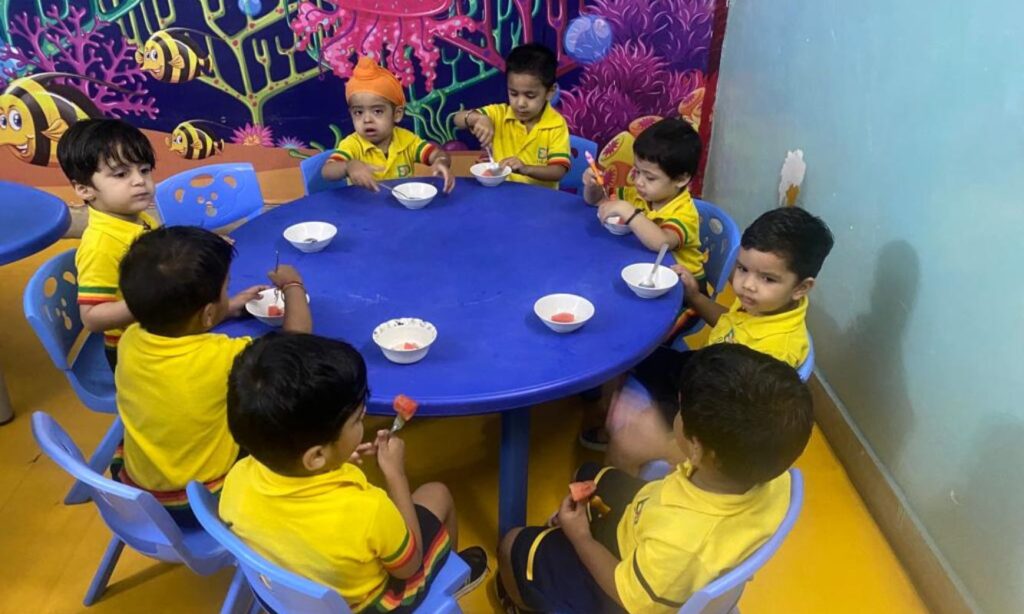
Nutrition Education for Kindergarteners : Cultivating Healthy Eating Habits
In the early stages of life, developing healthy eating habits is crucial for a child’s growth and well-being. Kindergarten marks the beginning of a child’s formal education journey, and it’s an opportune time to introduce them to the principles of nutrition. This article explores the importance of nutrition education for preschool kids and offers practical tips for instilling healthy eating habits.
The Importance of Nutrition Education for Kindergarteners:
Nutrition Education for Kindergarteners is important because it’s level goes beyond simply teaching children about food groups; it lays the foundation for a lifetime of good health. Here are some key reasons why nutrition education is vital for kindergarteners:
Healthy Growth and Development:
Proper nutrition is essential for physical and cognitive development during the early years. Nutrition Education for Kindergarteners is essential for fostering Healthy Growth and Development. Teaching kids about balanced eating empowers them to thrive physically and mentally, setting a strong foundation for a lifetime of well-being.
Establishing Lifelong Habits:
Habits formed in childhood tend to stick with us throughout our lives. Teaching healthy eating habits at a young age can set the stage for a lifetime of good choices. Nurturing young minds through Nutrition Education for Kindergarteners, we focus on establishing lifelong habits. Our program instills a love for healthy eating, setting the foundation for a lifetime of wellness and smart dietary choices.
Nutrition Education for Kindergarteners : Preventing Health Issues
Educating children about the benefits of nutritious foods can help reduce the risk of childhood obesity, diabetes, and other diet-related health problems.
Interactive Learning:
Use interactive activities like group discussions, food tastings, and games to make learning about nutrition fun and engaging. Bring nutrition to life with Interactive Learning, a dynamic approach for Kindergarteners to discover the joys of healthy eating.
Visual Aids:
Utilize colorful charts, posters, and illustrations to help children understand the different food groups and portion sizes. Utilize captivating Visual Aids to enhance Nutrition Education for Kindergarteners, making learning about healthy eating fun and memorable
Healthy Snack Time:
Encourage parents to send nutritious snacks to school and involve students in preparing simple, healthy snacks like fruit salads or yogurt parfaits. Nutrition Education for Kindergarteners introduces Healthy Snack Time, fostering nutritious choices and teaching kids the importance of balanced eating habits in a fun and informative way
Garden Projects:
If possible, create a small garden at school where students can grow and harvest vegetables, teaching them about the origins of their food. Garden projects offer hands-on Nutrition Education for Kindergarteners, fostering a love for fresh, nutritious foods. These engaging activities help children connect with nature, learn about plants, and develop healthy eating habits from an early age, ensuring a brighter, more wholesome future.
Storytelling:
Use age-appropriate books and stories about healthy eating to captivate their imaginations and reinforce the concepts. Storytelling in Nutrition Education for Kindergarteners sparks their imagination, fostering a lifelong love for healthy choices through captivating tales of fruits, vegetables, and the adventures of good nutrition.
Role Modeling:
Teachers and caregivers should lead by example by making healthy food choices themselves. In Nutrition Education for Kindergarteners, Role Modeling plays a vital role. Demonstrating healthy eating habits sets the foundation for a lifetime of good choices. Teachers and parents lead by example, inspiring young ones to embrace nutritious foods and a balanced diet for a healthier future.
Family Involvement:
Encourage parents to be part of the learning process by providing them with resources and tips on promoting healthy eating at home. Incorporate Family Involvement into Nutrition Education for Kindergarteners, fostering a holistic approach to healthy living. Together, we empower the next generation with the knowledge and habits they need for a brighter, healthier future.
Conclusion
Nutrition education for children of kindergarten in India is a vital component of their overall development. By introducing them to the importance of healthy eating habits early on, we equip them with the knowledge and skills needed for a lifetime of good nutrition. Through interactive and engaging activities, educators can make learning about food enjoyable and memorable, setting the stage for healthier, happier lives for our youngest learners.
